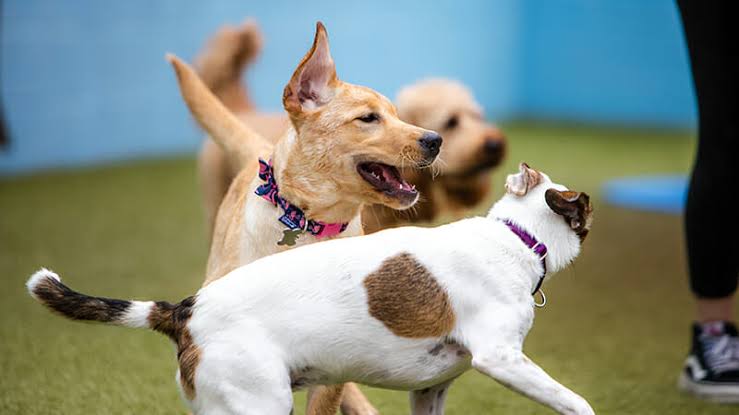
How to Socialize Your Dog with People and Other Pets
Socializing your dog is essential for their mental well-being and ability to interact confidently with people and other pets. This guide provides step-by-step tips on introducing your dog to new experiences, environments, and companions. Learn how to create positive interactions, build trust, and address challenges to ensure your dog becomes a well-adjusted and friendly member of your family and community.
🐶 Pet Star
12 min read · 13, Feb 2025

Why Socialization Matters
Socialization is more than just a way to make your dog friendly—it’s about building their confidence and teaching them how to respond appropriately to new situations. A well-socialized dog is:
- Less likely to develop fear or aggression toward strangers or other animals.
- Better equipped to handle changes in their environment.
- More enjoyable to take on outings or trips.
- A happier and more relaxed companion.
The best time to socialize a dog is during their critical socialization period, which occurs between 3 and 14 weeks of age. However, older dogs can also benefit from socialization with patience and consistency.
Step 1: Start Early and Go Slow
If you have a puppy, begin socialization as soon as they’ve received their initial vaccinations. For older dogs, take a gradual approach to avoid overwhelming them.
Tips for Early Socialization:
- Introduce your dog to new experiences one at a time.
- Keep interactions short and positive.
- Monitor your dog’s body language for signs of stress or discomfort.
Step 2: Expose Your Dog to Different People
Introducing your dog to a variety of people helps them feel comfortable around strangers and reduces the risk of fear-based aggression.
How to Socialize with People:
- Start with Familiar Faces: Begin by introducing your dog to family members and close friends.
- Expand to Strangers: Gradually expose your dog to people of different ages, genders, and appearances.
- Use Positive Reinforcement: Reward your dog with treats, praise, or playtime when they interact calmly with new people.
- Encourage Gentle Interactions: Ask people to approach slowly, avoid direct eye contact, and let your dog initiate contact.
Step 3: Introduce Your Dog to Other Pets
Socializing your dog with other animals is crucial for preventing aggression and fostering positive relationships.
How to Socialize with Other Pets:
- Choose Calm, Friendly Animals: Start with pets that are known to be well-behaved and tolerant.
- Use Neutral Territory: Introduce dogs in a neutral area, such as a park, to avoid territorial behavior.
- Supervise Interactions: Keep initial meetings short and closely monitor body language.
- Reward Good Behavior: Praise and treat your dog for calm and friendly interactions.
Step 4: Expose Your Dog to Different Environments
A well-socialized dog should feel comfortable in various settings, from busy streets to quiet parks.
How to Socialize in Different Environments:
- Start at Home: Begin with familiar surroundings and gradually introduce new environments.
- Visit Busy Places: Take your dog to parks, pet-friendly stores, and outdoor events.
- Expose to Sounds and Sights: Introduce your dog to common noises like traffic, sirens, and household appliances.
- Stay Calm and Positive: Your dog will take cues from your behavior, so remain relaxed and encouraging.
Step 5: Use Positive Reinforcement
Positive reinforcement is the most effective way to encourage good behavior during socialization.
How to Use Positive Reinforcement:
- Reward your dog with treats, praise, or playtime for calm and friendly behavior.
- Avoid punishment, as it can create fear and hinder the socialization process.
- Be consistent with rewards to reinforce desired behaviors.
Step 6: Address Challenges and Setbacks
Socialization doesn’t always go smoothly, and setbacks are normal. Here’s how to handle common challenges:
Fear or Anxiety:
- Go at your dog’s pace and avoid forcing interactions.
- Use desensitization techniques to gradually expose your dog to their fears.
- Consult a professional trainer or behaviorist if needed.
Aggression:
- Identify triggers and avoid situations that provoke aggression.
- Use counter-conditioning to change your dog’s emotional response to triggers.
- Seek professional help for severe aggression issues.
Overexcitement:
- Teach your dog basic commands like "sit" and "stay" to manage excitement.
- Reward calm behavior and redirect excessive energy into positive activities.
Step 7: Continue Socialization Throughout Life
Socialization is an ongoing process that should continue throughout your dog’s life. Regularly expose your dog to new experiences to keep their skills sharp and their confidence high.
Tips for Lifelong Socialization:
- Take your dog on regular outings to new places.
- Arrange playdates with other dogs.
- Enroll in training classes or group activities.
Tools and Resources for Socialization
Here are some tools and resources to help you socialize your dog effectively:
- Training Treats: Small, high-value treats for rewarding good behavior.
- Leash and Harness: Essential for controlling your dog during outings.
- Toys: Interactive toys to keep your dog engaged and distracted in new environments.
- Professional Help: Trainers or behaviorists for guidance and support.
Tools and Resources for Socialization
Here are some tools and resources to help you socialize your dog effectively:
- Training Treats: Small, high-value treats for rewarding good behavior.
- Leash and Harness: Essential for controlling your dog during outings.
- Toys: Interactive toys to keep your dog engaged and distracted in new environments.
- Professional Help: Trainers or behaviorists for guidance and support.
Similar Articles
Find more relatable content in similar Articles
Explore Other Categories
© 2024 Copyrights by rPets. All Rights Reserved.